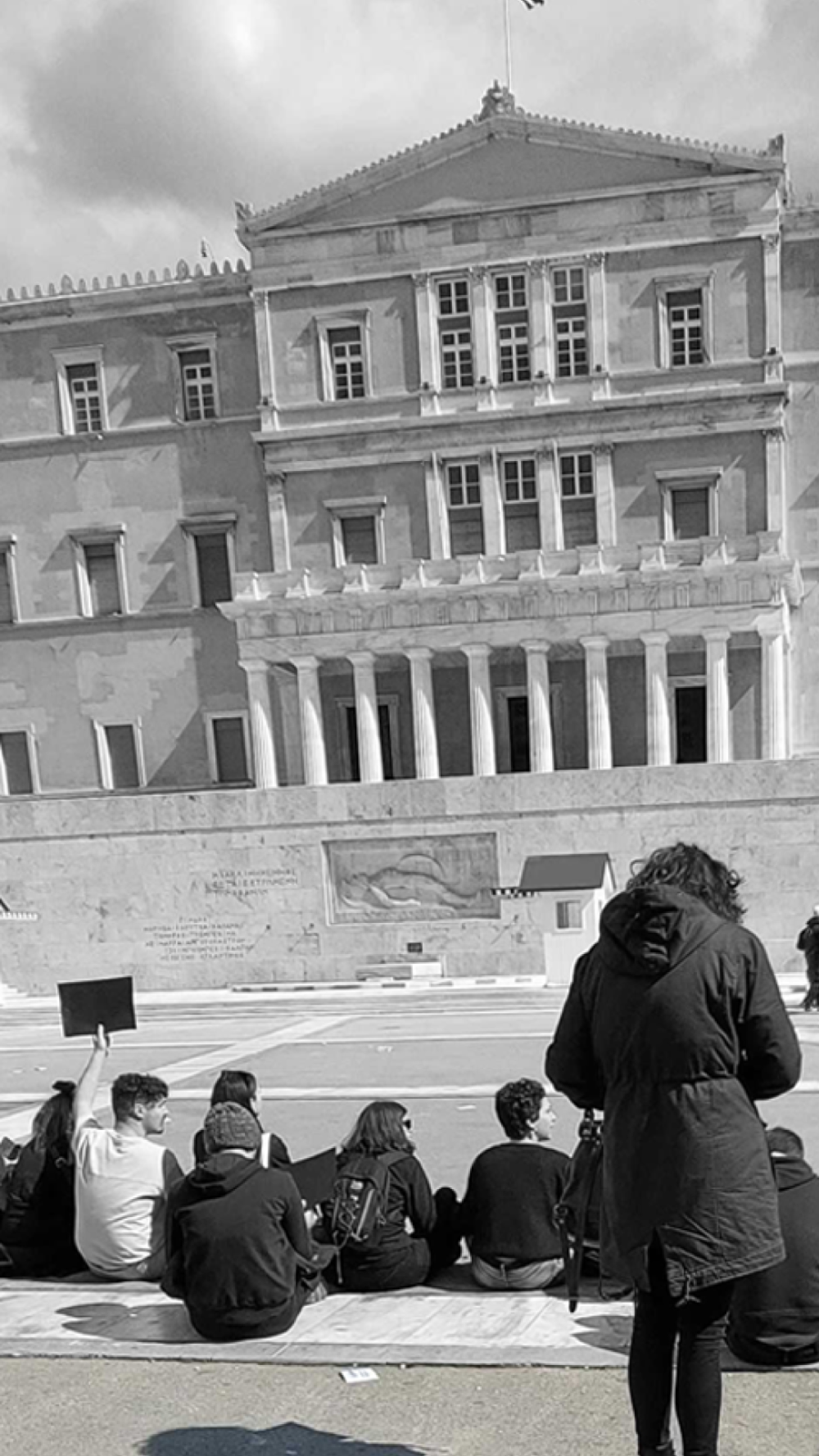
About Gen Z: in the mood for destabilising narratives
While thinking about stuff I could write in an article regarding Gen Z, I keep finding myself flirting with cringe./ I find solace in Ruth Milkman’s interview where she states that “Mannheim defines generations on the basis of their distinctive lived experiences and the worldviews that those experiences generate. (..) From a Mannheimian perspective, one might argue that Millennials and Gen Zers constitute a single generation, since they were shaped by so many of the same historical experiences./ Then I dwell on the fact that every time I think of something, I tend to lump groups of things or people. I don’t know how to explain what Gen Z is. How can anyone say what a generation is, anyways? I like to think of this generation through its discourse, or at least through the part of its discourse I choose to read and listen to.
***
you don’t have to sleep to see nightmares – Ann Clark
The distinctive lived experiences that Milkman talks about are the extended use of police brutality and sexual assaults. The relationship with the internet and insecurity. To those, we should add the pandemic, the (Greek) economic crisis that lasted over ten years, the consecutive rise of the Greek nazis and the Greek alt-right.
hell exists but only for the living – Kostas Tripolitis
(Did I just quote Tripolitis in an article about Gen Z? Sure, because this generation truly knows how to enjoy and embrace awkwardness; an awkwardness that lightly treads between cringe and acceptance).
***
It is a weekday and I’m walking down Sina Street in the city centre of Athens, passing right outside the School of Law of the University of Athens. There’s a bunch of people right outside. Judging from the books they’re holding, I’d say they’re first or second year law students. I observe their outfits, their hair, their looks. Do queer youth go to Law School? Apparently they do. If my memory isn’t failing me, back in the day, the School of Law was filled with either dapper conservative party youth members that practised on their ravenous neoliberal future, or tough boys from the trenches of the Left. Things have shifted apparently. A huge distance has been covered.
Using Milkman as my starting point, I pondered over some experiences that have common traits and now the time has come for me to think of our differences. The freedom there is now in gender expression, the distance kept from a predefined kind of normality, the challenge of a framework that is suffocating by default. Without claiming that I am able to correctly guess what each of those people waiting outside their faculty building is doing in their lives, I’d say that all that I just mentioned is combined with an unapologetic exploration of their desires and an expanded fluidity.
Gender roles destabilisation, identities destabilisation, destabilisation of all regulatory frameworks that originate from the national patriarchy; frameworks that were left untouched by the previous generations and were (and still are) underrated by large parts of the extended progressive movement. Everything can be traced back to our way of living, though, and it’s no accident that Paul Preciado in “Can the Monster Speak?”, which was recently translated and published in Greek by Antipodes Editions, references Monique Wittig who claimed that heterosexuality isn’t a sexual practice or a gender identity, but a political regime. In “One Is Not Born A Woman”, Wittig states that by denying heterosexuality, lesbians are class fugitives, just like the American slaves had to escape, in order to live free.
Milkman says that Millennials and Gen Zers are instinctively for intersubjectivity. I’d say that this is absolutely true for Gen Z. It is very hard to find a conversation where the different sides of patriarchy can stay hidden. It is hard to find a conversation where the class element will remain suppressed. It is hard to find a conversation that doesn’t contain criticism against the national core’s racism and violence.
Where the previous generation saw secondary contradictions, naturalities, sanctities, exaggerations and extremes, Gen Z recognises the political origins of the everyday stench that exists in the way we connect, flirt and have sex; in the way that capitalism defines our own identities. There has always been criticism that was expressed towards family, that much is true, but now it seems like it is taking a more central position and is coming from a side that doesn’t just want to talk about the oppression that often exists in this crucial nucleus, but also about unconventional family making and new kinds of relations.
***
When you tell me your life story/ I often respond/ With shivers down my spine/I curl up in an orange blanket/ I am being hauled around, blind and end up/ To the edge of the couch, of the cliff/ Inept at tears and poetry/ Asking for another kind of vision/ It’s only then that survival comes, suddenly and forcefully/ And sets me into a mandatory takeoff/ In defensive speed, nearing the speed of light
Lena Platonos
***
I came upon an article about the French existentialist philosopher, Gabriel Marcel. Marcel believed that an experience is unmediated by language and yet that every person should strive to be available to listen to the first-person narrations of others. I like that idea. I let it in.
At the same time, at yusra, a magazine I’m a part of, we receive an article written by a femininity who works in the catering industry. A first-person narrative, an experience from her workplace, self-observation, life in a metropolis. I feel like I’m reading something moving but also crucial, not just because the article is well-written, but also because I realise that all claims of vulnerability narratives – the personal that becomes collective and then political – are to be found in a rather heart-wrenching way.
We read many such texts (poetic, accusatory, autofiction). Such narratives are produced online, on the city’s walls, in slams, in magazines such as Teflon, in zines, in the current hip hop scene. Those narrations start from the personal gaze and direct experiences and give us brilliant images about what it means for someone to travel in public transport, to have an unprotected and precarious job, to walk alone at night, to show solidarity to one’s friends or to feel exhausted from a hostile reality.Those texts don’t fear a clash with patterns, they’re little cries, slogans, complete (whatever that means) poems, short novels, collages and memes, dystopian landscapes’ creation, spoken word, raps, performances. They’re narrations that even though they might look like the experiential posts that came out of millennial pens, especially after December 2008, they have significant differences.
The self-reference is there, just like in older texts, but in this case self-reference doesn’t use personal experience in a way that it leads to a (leftist) cool and sensitive depiction of the self, a lyrical phrasing of expectation or a future political optimism that connects the individual to an abstract collective. We are past this era when social observation, lived experience fragments and a pinch of Livaditis’ poetry could describe pretty much everything that was written (the signatory has lapsed into such vileness several times).
On the contrary, today there’s a text body that dives into lived experience only to touch trauma, bring it to the surface, process it and more importantly, share it. The strive to appear cool isn’t so intense anymore, instead there’s prominence of the broken self in an unapologetic manner, a tendency to express anxiety and to ensure that talking about mental health issues is no longer problematic. There’s a strong trend to discuss in detail and show in a practical manner what it means to live in a patriarchal society, what does aggression and violence mean in our entertainment, workplaces, meetings, relationships and everyday life. There’s class, insecurity, work and lack /denial of work and povertisation. Erotography is still unapologetically present, a claim for a new version of trash folkness, a link with pop culture and, more importantly, the body. Hotness and acceptance are there, at the centre of the narrative, without any strict limits or prerequisites of “normality” of any kind. There’s a constant renegotiation; frustration and exploration. At last we don’t talk (or, to be more precise, we don’t read) vaguely about girls and boys and beauty that will save the world, but rather for bellies, sweat, fingers, mouths and how we feel when one touches the other.
Milkman said that narration has been a characteristic trait of several social movements, clearly thinking of the history and practices of BLM. I think that this truly is a Gen Z trait. Both the will to narrate their lives in numerous media as part of the collective history, as well as the intention to run their course along the concept of availability, of “insatiable openness” (according to Marcel).
***
What I wrote is obviously a generalisation and, more specifically, a generalisation written from a distance – the distance of a (very) early millennial. Also, I wrote this piece focusing on a very specific (micro)cosm. Thus, I unavoidably turn to this particular (micro)cosm and this offers me great relief, because in it I can find words and lyrics such as these:
From the circle’s centre til the edge of the night/ I need a denial that won’t burn my throat/ Will love always be unpaid labour?/ Will we piss side by side and then say “oh well”?
Sci-Fi River
The article was published in greek on the 5th of April 2022



